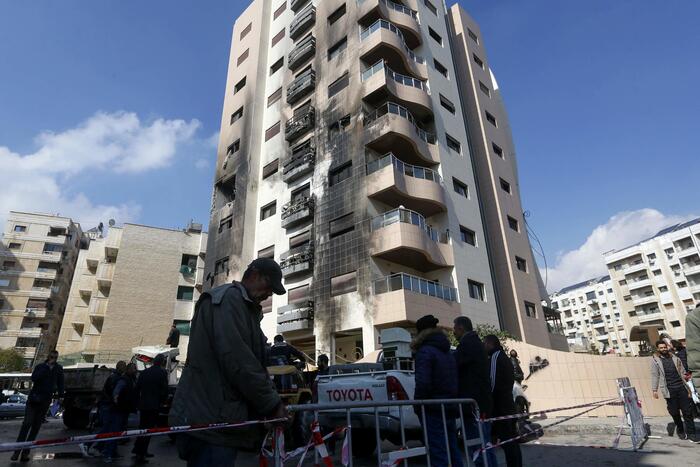Damascus-SANA
Syria’s musicians celebrated the inclusion of Al-Qudud Al-Halabi on the list of human heritage at UNESCO through a musical evening entitled “Qududuna… to the Human Heritage” revived by the Syrian National Band for Arab Music led by Maestro Adnan Fathallah, on the opera stage at Dar Al-Assad for Culture and Arts.
Veteran singers, academic singers, and young adults who received music sciences from the ancient Syrian conservatories participated in the celebration, in cooperation with the Syrian Trust for Development, in addition to musicians who came from all governorates, in a message that this great legacy is passed down through generations and that entire institutions of government and society are working to preserve it. .
The band chose to present the most famous Qadoud circulated and preserved in the memory of the Syrian people, as it began its program with the young people participating in the evening, namely Abdul Rahim Al-Halabi, Omar Al-Shalit, Ziad Ammouna and Hamza Jumrok, who presented the Qadoud link on the Maqam Al-Hijaz and included the performance of the songs “Hal Al Asmar Al-Loun” and “Ya Mayla Al Ghosoun” and “Al-Bulbul Naghi”, “Lulu and Blolo Shaleh Habibi” and “Qadak Al-Mayas”.
In the second part of the evening, in which the young singer Mahmoud Al-Haddad participated, he performed with the band a link from Al-Qudud on the Maqam Al-Hijaz, which included the songs “Ya Ghazali, how about me they have kept you”, “You have possessed my heart”, “Min Ajabi”, “Yaah from the fire of abandonment” and “Heymatni”. .
A link from Qudud on the Maqam al-Saba, which was presented by the mighty singer Ibn Damascus, Khaled Abu Samra, with the band in the third part of the evening, where he performed Qudood from different provinces, which are “Peace be upon you, Eliana” and “Oh, how would you like me to give you to me” and “Hallah Ya Jamalu” and “Oh my God! Your servant,” “Skaba, oh tears of the eye,” and “What makes you happy, Sobhia.”
The female singers had a role in presenting the Syrian qudud or writing poetry for her through different historical periods. The evening comes in the fifth part, a tribute to the Syrian singers, with the voice of the academic singer Linda Bitar, who presented a different link from Qudud and performed in it “I am in a screen”, “The Bachelorette” and “La Rasul Salami La Salem” And “Bali Ma’ak”, “Under Howdha” and “Oh, my pleasure, my pleasure.”
The son of the city of Aleppo, the almighty singer Safwan Al-Abed presented during the sixth part of the evening a group of qudud on the shrine of the Bayat, which are “The First Ten My Beloveds”, “Lemony on the Lemon”, “Al-Qarassih”, “Zaman Zaman”, “Zawalf Ya Bu Al-Zulf” and “Amen” My heart is safe”, “Mani, Habib Mani”, and “Al-Da’louna Al-Halabi”.
In the last part of the evening, all participants performed a joint link on the maqam of the Rast, which included “Ya Tira, my bird, O Pigeon”, “The Prophet Yamma”, “Malik Ya Sweet Malik”, “Sayd al-Asari” and “Ya Mal al-Sham”.
The ceremony was opened with a minute of silence for the souls of the martyrs of the homeland, followed by the playing of the Syrian Arab anthem, and then a special film was shown on the file of the nomination of Al-Qudud Al-Halabi on the list of intangible human heritage.
In her speech, the Minister of Culture, Dr. Lubana Mushouh, affirmed that Aleppo’s Qudoud, which constitutes an inclusive element of the rich and diverse Syrian identity, has become a registered human heritage, and no one has the right to deny its origins, its origins and its incubator, and the thieves of land and heritage will not be able to attribute it to themselves one day.
Mushawah explained that one of the results and virtues of registering the Aleppo Qudoud on the list of human heritage is that this Syrian heritage has become a trust in all of us, and we pass it on, like a precious pearl, to future generations to preserve, preserve and protect it from extinction and distortion. And amending the curricula of the preparatory and higher conservatories to give more space to teaching Al-Qudud and the methods of composing it and singing styles, in addition to publishing research, books and articles on this ancient art in a way that enhances its originality and transfers it to the map of modernity.
Mushawah pointed out that the world that boycotted Syria and besieged it culturally recognizes once again that we are people of civilization, that our roots are too deep to be uprooted, and that our culture is authentic and its components are exquisite, worthy of being protected and preserved, adding: “We have come a long way, and we still have many, no less important strides ahead. The ambition to protect the tangible and intangible national heritage.
The Minister of Culture thanked everyone who had a role in registering Qodd on the UNESCO list and said: “Thank you to the Syrian Trust for Development for its efforts in preparing the file and following it up, and thank you to our permanent representative at UNESCO for her efforts. The first lady, Asma al-Assad, who made on her priority the issue of strengthening the pillars of national identity and harnessing them in community development, all thanks and gratitude to her honorable person.
The CEO of the Syrian Trust for Development Shadi Al-Ashi pointed out that the inclusion of Al-Qudud Aleppine on the representative list of human heritage is a national privilege aimed at protecting the rich and diverse Syrian cultural identity, noting that Al-Qudud Aleppine is a living, intangible heritage that expresses authentic art and a Syrian Aleppo imprint in the East and a mirror that reflects A noble and ancient Syrian society that does not abandon its principles, rights and heritage.
Al-Ashi explained that the Syrian Trust for Development is committed to preserving and protecting this heritage as a duty and responsibility by reviving historical destinations and monuments, reviving the urban fabric and investing all opportunities to achieve sustainable development, in addition to preserving the intangible heritage by paying attention to our customs, traditions, practices, stories, songs and folk proverbs as a living heritage, indicating that the success of the Trust Inscribing Qudoud on the UNESCO list required four years of continuous work and cooperation with the community.
The ceremony was attended by a number of ministers and members of the central leadership of the Arab Socialist Baath Party, the Special Adviser to the Presidency of the Republic, Dr. Buthaina Shaaban, the Governor of Damascus, a number of members of the People’s Assembly, heads and representatives of diplomatic missions accredited in Damascus, and cultural, artistic, economic, social and media events.
On the 15th of this month, UNESCO included Al-Qudud Al-Halabi on the list of human heritage, during the meeting of the sixteenth session of the Intergovernmental Committee for the Protection of the Intangible Cultural Heritage in France. Qudoud and disseminate it more locally and globally, and train generations on this kind of ancient Syrian music.
Rasha Mahfoud















